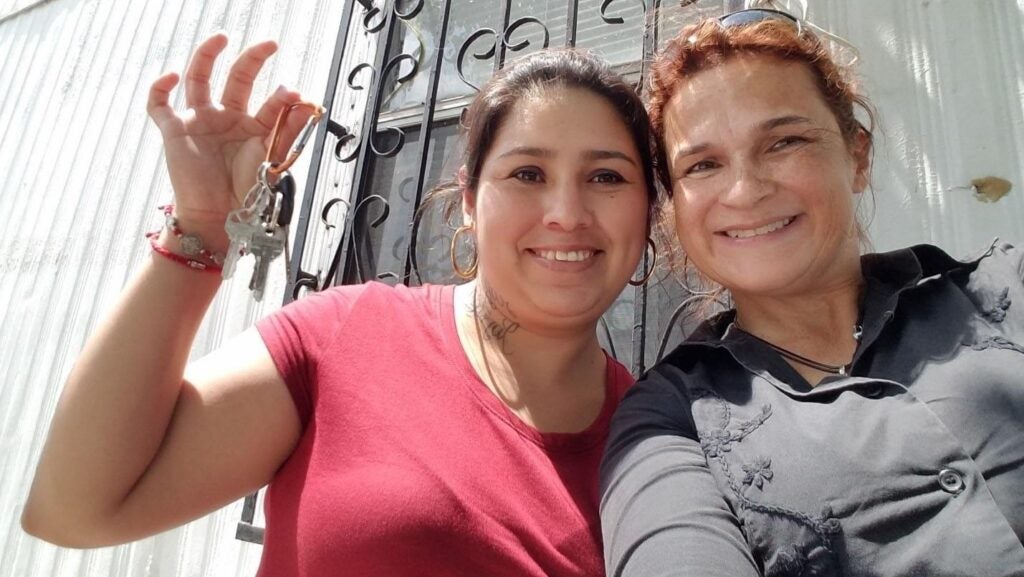

After Hurricane Irma devastated portions of Florida in 2017, Catholic Charities of the Diocese of Palm Beach initiated the Disaster Relief program to meet the needs of hundreds of people without power, food or shelter. Since it was launched in 2017, the program has aided more than 1,197 households and 2,945 individuals; it continues to sustain a handful of cases needing long-term support.
Carol Rodriquez, director of the Disaster Relief Program in the Diocese of Palm Beach, partnered with Catholic Charities USA before the local program was fully fledged in the diocese. She co-facilitated more than 15 outreach events with CCUSA, targeting communities in the Diocese of Palm Beach directly impacted by Hurricane Irma. Rodriquez led a team of part-time volunteers to conduct property and supplies assessments, as well as kept in touch with cases that needed follow up once immediate needs were addressed. Today, Rodriquez leads a team of seven case managers and one construction manager as they continue to address the needs of Palm Beach, Martin, St. Lucie, Indian River and Okeechobee counties two years later.
“So many people still live with holes in their roofs, severe water damage or worse. Some who we’ve helped had to find totally new homes after their houses were condemned because of Irma,” said Rodriquez.
She also explained that the majority of people the Disaster Relief Program assists are elderly, disabled, or vulnerable populations who live in mobile homes, apartments or government housing and can’t afford the repairs required to safely inhabit their homes.
“We had one case where an elderly couple, who both suffered from dementia, had a roof that was ripped apart and black mold was growing from the water damage. To repair the roof was going to cost $20,000 and to remove the mold was $15,000. When we reached out to the elderly couple, it was clear that they didn’t have family around to help them through this difficult time. It turned out that they had hired a roofing company to repair damages, but the company wasn’t legitimate and scammed them out of their money,” Rodriquez recalled. “It’s cases like these that make the program so important to the community.”
Funds for the Disaster Relief program come from CCUSA, Volunteer Florida, American Red Cross and United Way of Palm Beach County. Repairs are completed at no cost to most clients, and the relief team even supply clients with enough money for rent, utilities and groceries when businesses close due to hurricane damage. “A lot of people were unemployed for months because their place of business shut down and they couldn’t provide for themselves or their families,” Rodriquez remarked.
Maria Melo, a case manager for the Disaster Relief Program, brings 34 years of experience working with the Red Cross to client cases. “I guided Maria de la Paz Martinez, a single mother living in a one-bedroom mobile home, through the application process for disaster relief funds from the Red Cross. She received $2,000 to make repairs, but to repair the mobile home completely cost just as much as getting a new one altogether,” said Melo. “I was determined to get her and her family back home, so we re-applied for more grant assistance and she received another $4,500. That, combined with her own savings, enabled her to get a new three-bedroom mobile home to comfortably fit her and her children. She’s going to surprise her children this weekend!”
Both Rodriguez and Melo revealed that disaster response organizations like the Red Cross provide immediate assistance for a finite amount of time. After that, the Catholic Charities Disaster Relief Program steps in, supporting clients until a sense of normalcy can be restored. But one thing stands in the way of making the program a permanent part of disaster relief resources in Palm Beach County. “We need more support—monetarily and manpower,” Rodriquez said. “We are so grateful to the people who donate after a hurricane hits, but its more important they give before disaster strikes. We hope people keep in mind organizations like ours year-round, not just during hurricane season.”
Currently, funds are still available for anyone in the Diocese of Palm Beach suffering from damage directly related to Hurricane Irma. Services available include case management; assessment of family needs for employment, housing, food, healthcare, transportation, education, counseling, and spiritual needs; home repair assistance; linkage to helpful services and programs; Spanish and Haitian Creole-speaking case managers.








